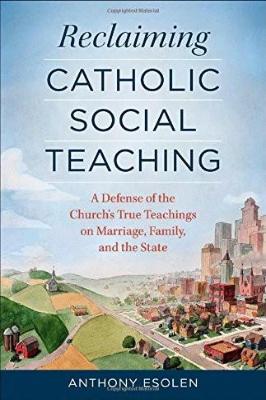
Reclaiming Catholic Social Teaching
U.S. Delivery in 5-10 business days.

Many claim that Catholic Social Teaching implies the existence of a vast welfare state. In these pages, Anthony Esolen pulls back the curtain on these false philosophers, showing how they've undermined the authentic social teachings of the Church in order to neutralize the biggest threat to their plans for secularization the Catholic Church.
With the voluminous writings of Pope Leo XIII as his guide, Esolen explains that Catholic Social Teaching isn't focused exclusively on serving the poor. Indeed, it offers us a rich treasure of insights about the nature of man, his eternal destiny, the sanctity of marriage, and the important role of the family in building a coherent and harmonious society.
Catholic Social Teaching, explains Pope Leo, offers a unified worldview. What the Church says about the family is inextricable from what She says about the poor; and what She says about the Eucharist informs the essence of Her teachings on education, the arts and even government.
You will step away from these pages with a profound understanding of the root causes of the ills that afflict our society, and, thanks to Pope Leo and Anthony Esolen, well equipped to propose compelling remedies for them.
Only an authentically Catholic culture provides for a stable and virtuous society that allows Christians to do the real work that can unite rich and poor. We must reclaim Catholic Social Teaching if we are to transform our society into the ideal mapped out by Pope Leo: a land of sinners, yes, but one enriched with love of God and neighbor and sustained by the very heart of the Church's social teaching: the most holy Eucharist.
Fr. George Rutler
"The lively mind of Professor Esolen is incapable of cliché, and he is artful in detecting the platitudes which have misled much of our culture's understanding of the social order.
Fr. Peter John Cameron, O.P. Editor-in-chief, Magnificat
Anthony Esolen s brilliant analysis of liberty, marriage, family, and other key issues of Catholic Social Teaching deserves to be a standard text in moral theology and catechesis.
Robert Royal, Faith and Reason Institute
"Freshness and insight are always evident in Anthony Esolen's writing. It's nothing less than a minor miracle that he's maintained those rare qualities in this illuminating treatment of one of the most poorly understood subjects: Catholic Social Teaching. This is a splendid — an essential — book."
Fr. C.J. McCloskey
"An unapologetic defense of marriage and family by America's best Catholic writer."